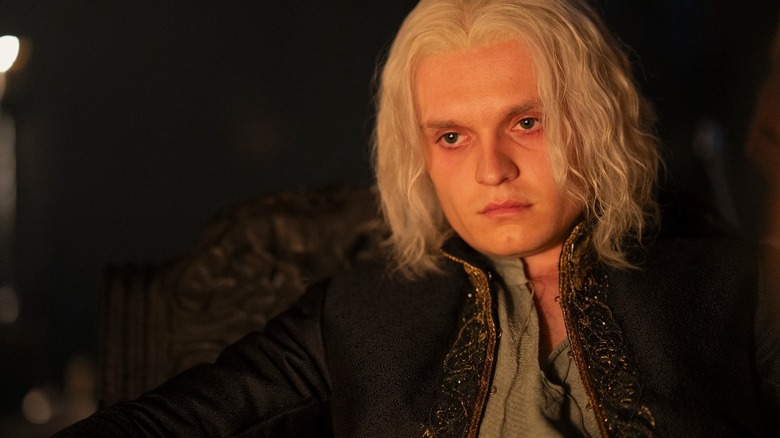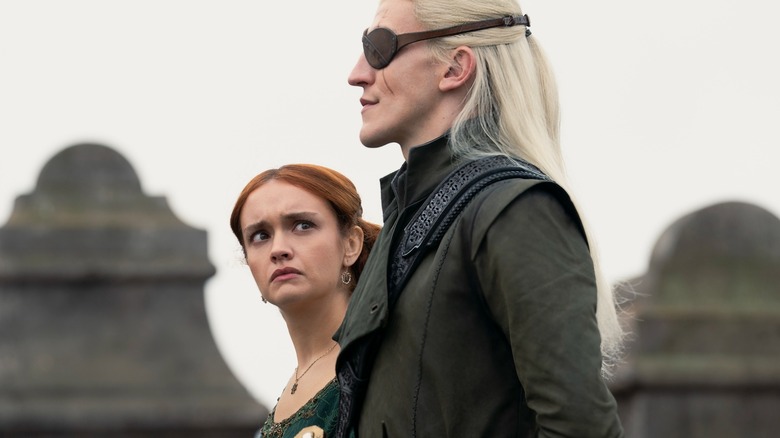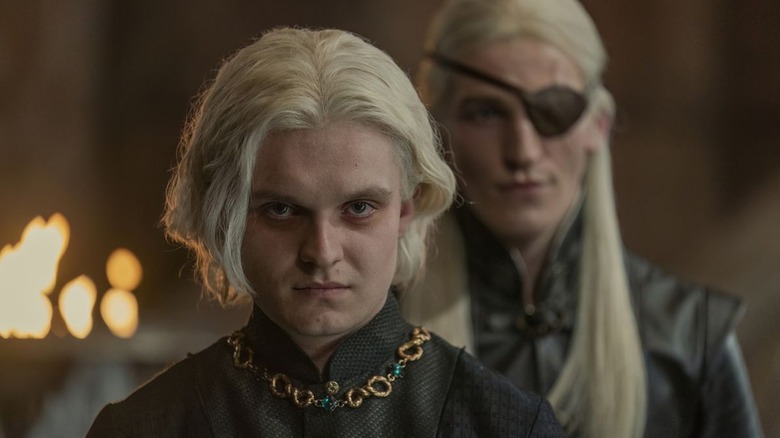House Of The Dragon Season 2's Biggest Betrayal So Far Deserves A Closer Look
This post contains spoilers for "House of the Dragon."
When war breaks out in Westeros, the bonds between kin often snap under pressure, leading to unexpected betrayal. The Dance of the Dragons, which occurred between 129 to 131 AC, eventually brought about the disintegration of House Targaryen thanks to violent in-fighting amongst kin that escalated into a vicious battle of succession. With "House of the Dragon" currently poised to kick off this civil war between Team Black and Team Green, season 2, episode 4 plunges us straight into the seminal Battle at Rook's Rest, along with this season's most unexpected betrayal, which breaks canon in significant ways.
The trap sprung by Ser Criston Cole (Fabien Frankel) at Rook's Rest was not a one-man scheme, but a shrewd plan concocted alongside Aemond (Ewan Mitchell), who kept himself hidden until it was time to unleash his prowess as a military strategist and dragon-rider. There were some unpredictable variables that both men had no control over. For instance, Cole and Aemond had no way of knowing which dragon-rider(s) Rhaenyra (Emma D'Arcy) would end up sending to aid Lord Staunton, or that Aegon (Tom Glynn-Carney) would burst into the scene with Sunfyre as a last-ditch effort to assert his authority as ruler. Although Rhaenyra had only sent Rhaenys (Eve Best) and Meleys to thwart the attack, the Queen Who Never Was fought valiantly until Vhagar tore the smaller dragon apart, causing both to fall to their deaths.
Aegon and Sunfyre, whose dual presence should have strengthened Team Green's morale during the battle, end up becoming a liability after crashing into the forest, singed and grievously injured. The person responsible for this fate is none other than Aemond, a brother scorned. This begs the question: what prompted this massive betrayal?
Aemond is sick of lurking in the shadows
Childhood traumas have more hold on us than we would like to admit, and understandably so, as these formative experiences contribute to our worldviews and how safe we feel in the presence of another. None of the Targaryen/Velaryon kids experienced normalcy while growing up; they were all thrust into a world of duty, power, responsibility, and deceit even before they could connect with themselves or comprehend their innermost instincts. However, some, like Aemond, have always felt invisible despite putting substantial efforts into shouldering responsibility or looking out for their own.
In stark contrast, Aegon has never shouldered serious responsibility despite being the first-born. He has been sexually abusive, drowned himself in liquor instead of processing sorrow, and flaunted his callous attitude whenever confronted. Even as a young kid, he contributed to Aemond being viciously bullied when he teamed up with Rhaenyra's children to mock his lack of a dragon, thus twisting the knife of resentment deeper. In the present, as King of the Iron Throne (a title that simply fell into his lap), Aegon's bristling, impotent anger hurts him during significant decision-making and leaves him vulnerable to manipulation — traits that only prove that he was never fit to be a ruler.
Aemond's reasons for resenting his brother do not simply lie in the past; he is also a silent observer of the current inadequacies that render Aegon ineffective which simultaneously informing his decisions as King. Aemond is objectively more deserving of the King's mantle; he is not susceptible to unchecked emotions or manipulations, and is a formidable strategist and military advisor. A culmination of these factors hurls Aemond towards a simple goal: forceful usurpation when the opportunity presents itself, which is exactly what transpires during the Battle at Rook's Rest.
Aegon's callous cruelty contributes to his downfall
Aemond's urge to murder his brother does not form in a vacuum. Aegon's latest transgression can be traced back to when he and his knights visited the brothel and mocked Aemond's vulnerability without remorse. "You've come so far, yet you still lie with your very first," Aegon jeered, forgetting the consequences of toying with his brother under the influence of alcohol and revelry. Aemond, although internally rattled, stands up without bothering to dress — a deliberate stance to prove he has no weaknesses or, rather, any weaknesses he does have are not tools for exploitation. Aegon kept snickering, oblivious to the fact that this act of cruelty would come back to haunt him.
Although Aemond did not anticipate Aegon's presence at Rook's Rest, he viciously honed in on his repressed emotions after seeing him, instructing Vhagar to burn his brother without hesitation. It is interesting that Aemond does not immediately go after Rhaenys, but takes his brother out of the equation first, directing Vhagar's wrath at him while Rhaenys ducks out of the way. After Rhaenys is killed, Aemond swoops down to the forest to finish the deed with a sword, but Cole frantically stops him, causing him to silently retreat.
Even though Aemond does not succeed in killing his kin, Aegon is no longer in a condition to rule, which means that the crown will now be deferred to the next in line. What is more dangerous than a man who can keep his vulnerabilities in check and put his emotions aside until it is time to unleash them? Team Green will undoubtedly benefit from Aemond's reign as regent, and it remains to be seen how this sudden change of hands will affect the tides of war.
New episodes of "House of the Dragon" drop Sundays on HBO and Max.


